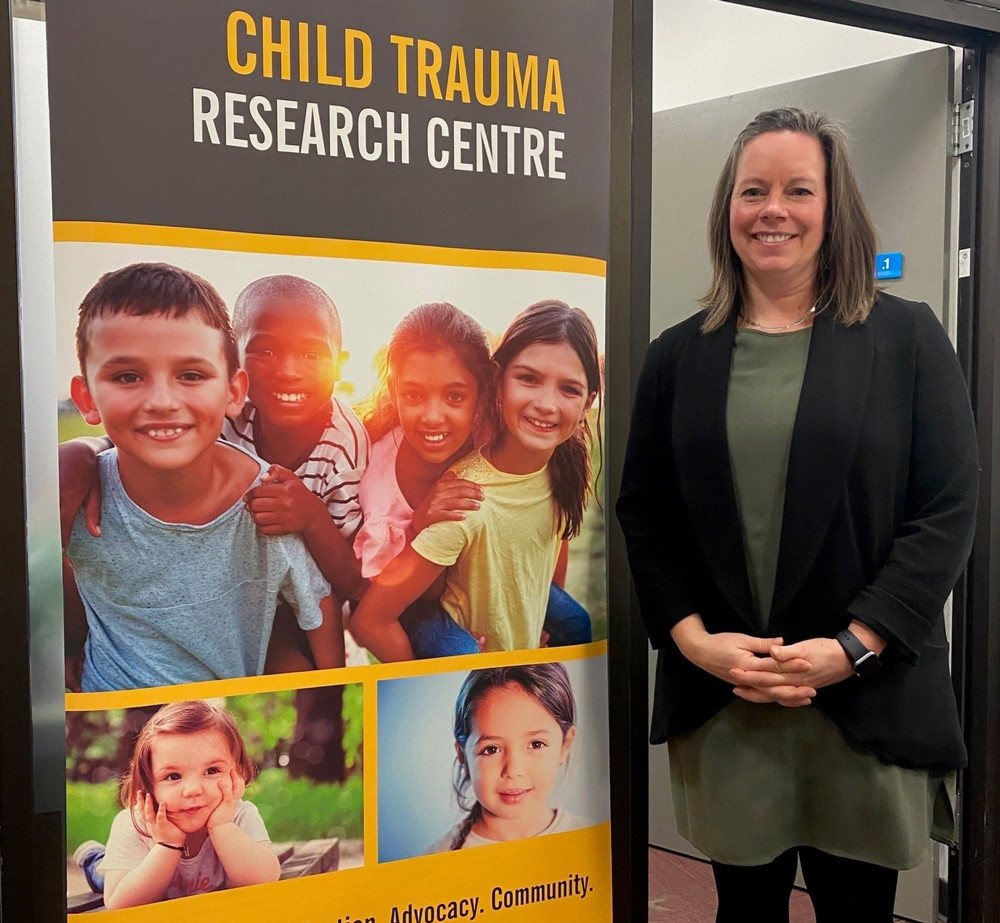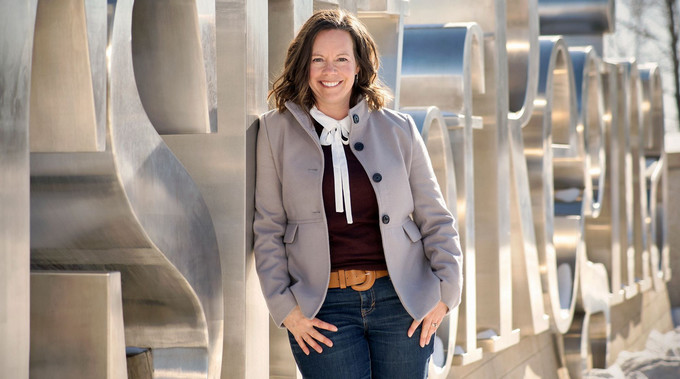Nathalie Reid was in grade 5 when she saw her first ‘missing man’ formation, heard the roar of jet engines rattling her school’s windowpanes, disrupting recess on the playground, and watched as one of the pilots flew their F-18 fighter jet out of the formation and straight up into the sky until it disappeared from view.
“The bell rang to head back inside the school, and I remember thinking, ‘I wonder what my teacher is going to say about this?’” recalls Nathalie who, growing up on Canadian Air Force bases, developed a keen awareness of the fragility of life. “A family friend had died in a plane crash and at his funeral, as is customary, three planes flew low over the Chapel before the middle plane pulled up into the sky to salute his memory and sacrifice.”
Her teacher said nothing. The kids got out their worksheets and did their math.
“I remember sitting there going—this isn’t right,” says Nathalie. “That moment was the start of my journey to understand and improve what we’re doing in schools for and with kids who are in the midst of really hard things.”
Fast forward a decade and a half later and Nathalie, a newly minted teacher with a deep passion for teaching, was just four days into her first job on September 11, 2001, when Canadian F-18s started circling the city of Ottawa, following the World Trade Centre terrorist attacks in the United States.
When you’re a teacher, you see the good, the bad, and the ugly, but teachers didn’t have the trauma-informed language and training to support the kids that was urgently needed. — Dr. Nathalie Reid, Director, Child Trauma Research Centre
“My dad was a fighter pilot so this sound didn’t register with me right away as being unusual, but my students were diving under their desks screaming ‘They’re here! They’re here! We’re next!’” says Nathalie. “The 22-year-old me had no idea how to respond. When you’re a teacher, you see the good, the bad, and the ugly, but teachers didn’t have the trauma-informed language and training to support the kids that was urgently needed.”
So that is what Nathalie did. In addition to being a full-time teacher, she earned a master’s degree and then focused her doctoral work on teachers’ experiences with childhood trauma and trauma sensitivity. Now, Dr. Nathalie Reid is Director of the Child Trauma Research Centre (CTRC) at the University of Regina and is tackling the urgent challenge to society posed by increasing signs of child trauma and a decline in child and youth mental health in Canada, specifically for families who work in the public safety sector.

Dr. Reid and the PSP YK research team at CTRC will study the experiences of PSP youth and kids to determine the best resources and methods for supporting them, thanks to the support of the Medavie Foundation. Photo Credit: U of R Photography.
“What began as a growing awareness of posttraumatic stress disorder (PTSD) in public safety personnel (PSP), has expanded organically to include the mental health and well-being of PSP families and now PSP children,” explains Reid.
She recently received $600,000 from the Medavie Foundation to establish PSP Youth and Kids (PSP YK), a web-based hub of resources, materials, and activities tailored to the experiences of PSP youth, children, and caregivers.
When a parent is living with post-traumatic stress, it can impact the family unit. As a result, children can often carry invisible burdens of their own, and need support tailored to their unique needs. — Andrea Elliott, Executive Director of the Medavie Foundation
“Supporting public safety personnel is close to our hearts at the Medavie Foundation,” says Andrea Elliott, Executive Director of the Medavie Foundation. “When a parent is living with post-traumatic stress, it can impact the family unit. As a result, children can often carry invisible burdens of their own, and need support tailored to their unique needs. That’s why we’re proud to support the Child Trauma Research Centre at the University of Regina—to help bring evidence-based support to families who give so much, and make sure they have what they need to live life fully.”
With its critical mass of mental health expertise, research, and education across the human lifespan, the U of R is uniquely positioned to undertake a holistic approach to children’s mental well-being.
“Thanks to our partnership with the Medavie Foundation, the University of Regina will be working in innovative and dynamic ways to support this population,” says Reid.
Under her direction, the PSP YK team at CTRC will study the experiences of PSP youth and kids to determine the best resources and methods for supporting them, and provide critical training for those who are entrusted with their care, such as their parents, caregivers, teachers, nurses, and counselors.
Children will have the language they desperately need to identify and communicate what they’re experiencing and those who work with children will have the knowledge and tools they need to support them. — Dr. Nathalie Reid, Director, Child Trauma Research Centre
“Children of public safety personnel have life experiences shaped by their adults’ occupational risks and requirements that we have to pay attention to,” says Reid. “On top of the typical life experiences, PSP kids have a layered existence of responsibility, pride, struggle, care, and difficulty because of their caregivers’ exposure to potentially traumatic events. Their families are out of sync with the more typical life trajectory—their parent or guardians will most likely miss multiple typical celebration days such as birthdays, or holidays; and even when they are physically present, they might have to sleep to be able to go back out on shift. It takes a lot of managing and understanding on the part of the young people.”
Reid has seen some children go so far as to lie about their PSP parent or guardian’s occupation.
“They don’t want to tell their friends that their parent is a police officer,” explains Reid. “Because they’re afraid that if they tell the truth, their friends won’t come to their house or they won’t get invited out anywhere.”
Over the next three years, Reid and her students will be studying the experiences of Canadian PSP kids and youth, developing evidence-based methods and Canadian-specific resources for supporting their mental health (such as books, games, and interactive psychoeducational materials) and creating training resources and sessions for their guardians and those who work closely with children.
“We want to develop this space for them that is very user-friendly and interactive,” says Reid. “Where they can feel seen and heard and realize that they’re not alone. Children will have the language they desperately need to identify and communicate what they’re experiencing and those who work with children will have the knowledge and tools they need to support them.”
Learn more about the Child Trauma and Research Centre.
Banner photo: Dr. Nathalie Reid is Director of the Child Trauma Research Centre at the U of R. Photo Credit: U of R Photography.
About the University of Regina
2024 marked our 50th anniversary as an independent University (although our roots as Regina College date back more than a century!). As we celebrate our past, we work towards a future that is as limitless as the prairie horizon. We support the health and well-being of our 17,200 students and provide them with hands-on learning opportunities to develop career-ready graduates – more than 92,000 alumni enrich communities in Saskatchewan and around the globe. Our research enterprise includes 18 research centres and 9 Canada Research Chairs. Our campuses are on Treaties 4 and 6 - the territories of the nêhiyawak, Anihšināpēk, Dakota, Lakota, and Nakoda peoples, and the homeland of the Michif/Métis nation. We seek to grow our relationships with Indigenous communities to build a more inclusive future.
Let’s go far, together.
